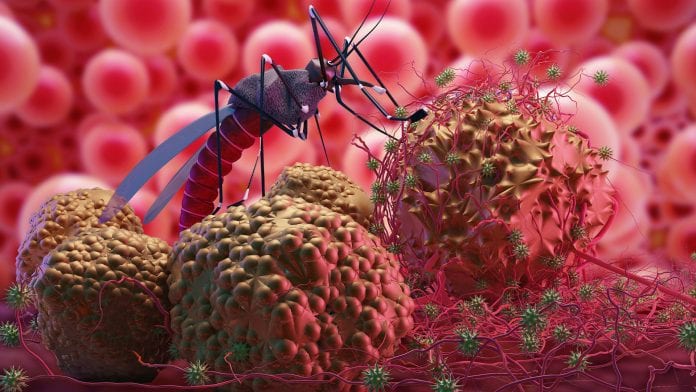Malaria FAQs

Malaria is a disease that is caused by a single-cell parasite and transmitted by female mosquitoes. Malaria is a serious and sometimes deadly disease that is caused by a parasite. It commonly infects a certain type of mosquito which feeds on humans. People infected with malaria are typically very sick with high fevers, shaking chills, and flu-like illnesses.
Four kinds of malaria parasites infect humans. They are:
- Plasmodium falciparum,
- Plasmodium vivax,
- Plasmodium ovale, and
- Plasmodium malariae.
In addition, Plasmodium Knowles is a type of malaria parasite that naturally infects macaques (some monkeys) in Southeast Asia. Not only does it infect monkeys, but it also infects humans. It causes malaria to be transmitted from animal to human (“zoonotic” malaria).
Plasmodium falciparum is a type of malaria that can cause severe infections. If those infections are not treated promptly, they may lead to death.
Malaria can also be transmitted from blood contact, like when sharing needles or during blood transfusions.
What Are The Symptoms Of Malaria?
People who are infected with malaria are most of the time very sick with high fevers, shaking chills, and flu-like illnesses. It is important to know that your baby is unlikely to get malaria in the first two months of her life. This is because of the immunity the mother gave her during pregnancy. As the baby gets older, she loses that immunity, and her risk of catching malaria increases.
Malaria tends to be more severe in children under five years old. Symptoms start showing about 10 days to four weeks after being bitten.
If your little one is younger than five, you should look out for these malaria symptoms: Fever, shivering, cold, irritability, and drowsiness. Other symptoms include poor appetite, sleeplessness, vomiting, stomach pain, hypothermia (instead of a fever), and rapid breathing.
Is Malaria Contagious?
No, malaria cannot be spread from person to person, like a cold or flu. Malaria is not sexually transmitted either. That means that you cannot get malaria from casual contact with malaria-infected people, like sitting next to someone who has malaria.
Do All Mosquitoes Transmit Malaria?
No, scientists have identified over 2000 species, but the female anopheles mosquitoes are known to transmit malaria.
Is Malaria Seasonal?
Don’t be fooled. Malaria occurs all year round, but the number of cases skyrockets during the rainy season. Why the rainy season? The cases of malaria increase during the rainy season because of the favorable warm, humid weather and stagnant water that is common then.
With plenty of stagnant water and warm weather, you have a perfect breeding ground for mosquitoes that cause malaria.
Do Mosquitoes Transmit HIV/AIDS?
Although this is a common fear of most people, there is no evidence to support the theory that mosquitoes can transmit (HIV). It is important to note that when a mosquito feeds on a human, it injects a small amount of saliva, which acts as a lubricant so that the mosquito can feed very smoothly.
The mosquito never injects another person’s blood into the person it is feeding. Even if there were small amounts of blood on the mosquito’s mouthparts, there would have died or disappeared before the mosquito feeds again.
Why Is The The Treatment of Malaria Important In Pregnant Women?
Since pregnancy weakens the immune system of pregnant women, the mother can transmit the malaria parasites to the unborn child.
A woman that catches malaria while pregnant has greater chances of maternal anemia, low infant birth weight, among others. Zeramal is not safe in pregnant women during the 1st trimester of pregnancy.
What Do I Do If My Child Has Symptoms Of Malaria?
If you suspect that your child may be coming down with a high fever and chills, you need to contact your doctor as soon as possible. Only a blood test will confirm if your child has malaria. By getting your child to your doctor as soon as possible, you will keep your child safe.
Trending Health Topics
- ADHD
- Allergies
- Arthritis
- Bipolar Disorder
- Bunions
- Car Accidents
- Chron's Disease
- Common Cold
- COPD
- Depression
- Dry Skin
- Dry throat
- Eczema
- Fungal Infection
- GERD
- HIV/AIDS
- Hypertension
- Irritable Bowel Syndrome (IBS)
- Multiple Sclerosis
- Osteoarthritis
- Psoriasis
- Rheumatoid Arthritis
- Skin Disorders
- strep throat
- Type 2 Diabetes
- Uncategorized